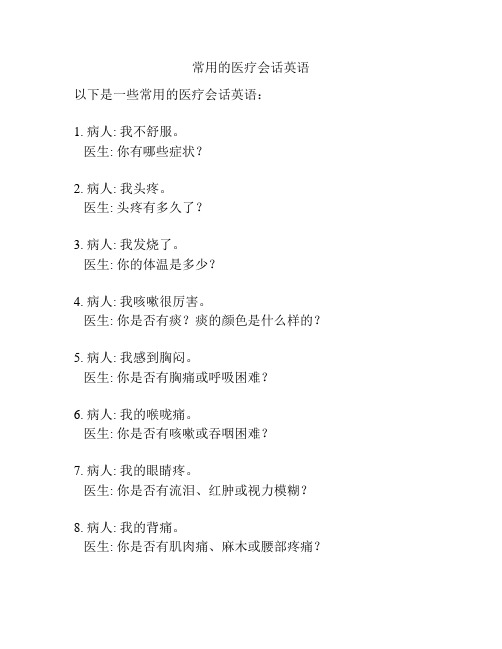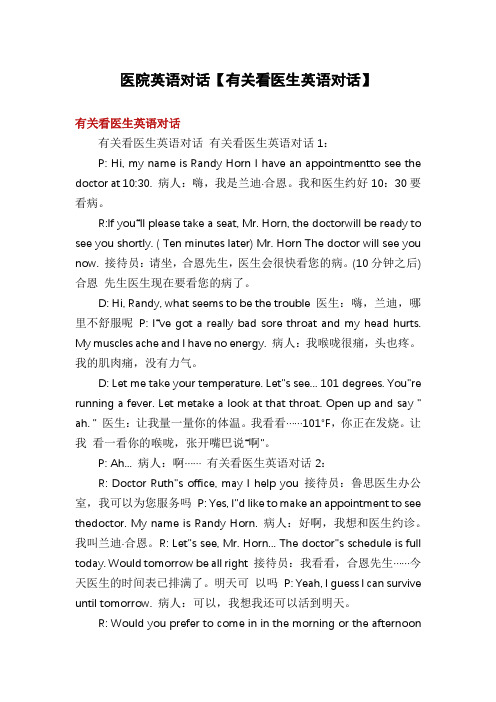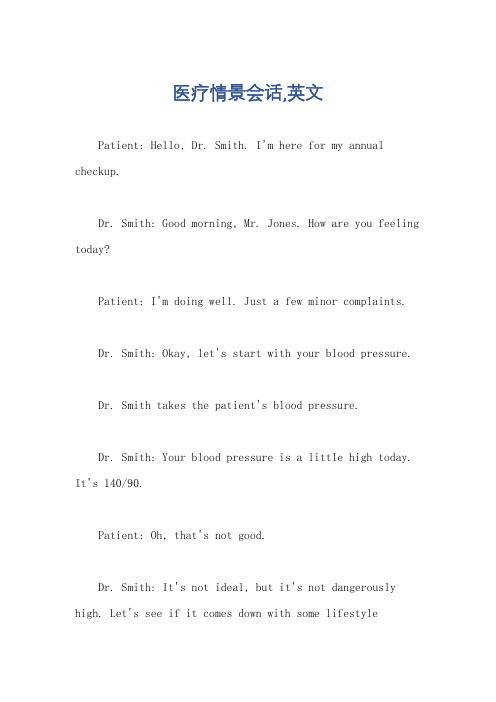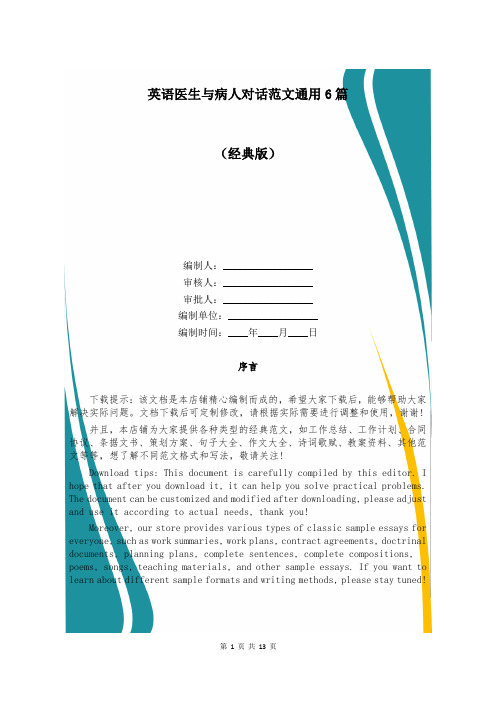诊疗英语会话
口腔诊疗英语对话

口腔诊疗英语对话Dialogue between Dentist and PatientDentist: Good morning! How can I assist you today?Patient: Hi, I've been experiencing toothache for the past few days, and it's been quite painful.Dentist: I see. Let me examine your teeth. Please sit on the dental chair and open your mouth wide.Patient: (Sits on the dental chair and opens mouth)Dentist: (Examines the patient's teeth) It seems like you have a cavity in one of your molars that is causing the pain. I recommend filling it to prevent further damage. Are you okay with that?Patient: Yes, please go ahead. How long will it take?Dentist: It should take approximately 30 minutes. I will numb the area with local anesthesia before starting the procedure to ensure you don't feel any pain.Patient: Sounds good. Will there be any side effects or post-treatment care?Dentist: You may feel some numbness in the treated area for a few hours after the procedure. It's important to avoid eating anything until the numbness wears off to prevent accidentally biting your cheek. Also, try to chew on the opposite side of your mouth for aday or two. The filling will need some time to harden completely.Patient: Understood. Anything else I should be aware of?Dentist: We also recommend practicing good oral hygiene, such as brushing your teeth twice a day and flossing regularly, to prevent future cavities. Additionally, avoid consuming excessive amounts of sugary foods and drinks as they can contribute to tooth decay.Patient: I'll keep that in mind. Thank you for your advice and for treating my toothache.Dentist: You're welcome. If you have any further issues or questions, don't hesitate to schedule a follow-up appointment. Have a good day!Patient: Thank you, I will. Goodbye!。
医学英语会话医生篇

医学英语会话医生篇一、Asking about Symptoms(询问症状)1. Word: Ache- English Explanation: A continuous dull pain.- Phrase: Headache, toothache.- Usage: “I often get an ache in my lower back after sitting for a long time.”- Bilingual Example: “Do yo u have any aches? For example, a headache or a stomachache? I need to know what's wrong with you.”2. Word: Nausea- English Explanation: A feeling of sickness with an inclination to vomit.- Phrase: Nausea and vomiting.- Usage: “Sheplained of nausea this morning.”- Bilingual Example: “You look a bit pale. Are you feeling nausea? It could be a sign of many things.”3. Word: Fatigue- English Explanation: Extreme tiredness resulting from mental or physical exertion or illness.- Phrase: Chronic fatigue.- Usage: “Fatigue is amon symptom among patients with certain diseases.”- Bilingual Example: “You seem so tired all the time. Is it just normal fatigue or something more serious? I'm worried about you.”4. Word: Dizziness- English Explanation: A feeling of faintness, unsteadiness, and wooziness.- Phrase: Sudden dizziness.- Usage: “He experienced dizziness when he stood up too quickly.”- Bilingual Example: “Hey, you said you felt funny. Was it dizziness? That can be really concerning.”5. Word: Rash- English Explanation: An area of reddened, inflamed skin.- Phrase: Skin rash.- Usage: “A rash on the body can be caused by various factors.”- Bilingual Example: “I noticed you have a rash o n your arm. What do you think might have caused it? It's important we figure this out.”二、Diagnosing(诊断)6. Word: Diagnosis- English Explanation: The identification of the nature of an illness or other problem by examination of the symptoms.- Phrase: Accurate diagnosis.- Usage: “The doctor's diagnosis was based on a series of tests.”- Bilingual Example: “I've done all these tests, and my diagnosis is that you might have a mild infection. It's not too bad, but we need to treat it.”7. Word: Symptom- English Explanation: A physical or mental feature which is regarded as indicating a condition of disease.- Phrase: Key symptoms.- Usage: “We need to look at all your symptoms to make a proper diagnosis.”- Bilingual Example: “These symptoms you have are like pieces of a puzzle. We have to put them together to figure out what's wrong. Do you understand?”8. Word: Disorder- English Explanation: An illness that disrupts normal physical or mental functions.- Phrase: Mental disorder.- Usage: “There are many different types of disorders that can affec t a person.”- Bilingual Example: “I'm afraid you might be showing signs of a certain disorder. But don't worry, there are treatments available.”9. Word: Illness- English Explanation: A disease or period of sickness affecting the body or mind.- Phrase: Chronic illness.- Usage: “Living with a chronic illness can be very challenging.”- Bilingual Example: “Your symptoms suggest an illness. But we need more information. How long have you been feeling like this? It's crucial for me to k now.”10. Word: Disease- English Explanation: A disorder of structure or function in a human, animal, or plant, especially one that produces specific signsor symptoms or that affects a specific location and is not simply a direct result of physical injury.- Phrase: Infectious disease.- Usage: “Preventing infectious diseases is very important in public health.”- Bilingual Example: “I suspect you mig ht have a disease.Don't be scared. We'll do more tests to confirm it. Have you been arou nd anyone who was sick lately?”三、Treatment(治疗)11. Word: Treatment- English Explanation: The use of medical methods to try to cure an illness or injury.- Phrase: Medical treatment.- Usage: “The patient is receiving treatment for his heart condition.”- Bilingual Exam ple: “I think the best treatment for you right now is some rest and taking these medications. You'll be okay, trust me.”12. Word: Therapy- English Explanation: Treatment intended to relieve or heal a disorder.- Phrase: Physical therapy.- U sage: “After the accident, he needed physical therapy to regain his mobility.”- Bilingual Example: “We might need to consider therapy for your problem. It could be like a magic wand to make you feel better.”13. Word: Medication- English Explanation: A drug or other form of medicine that is used to treat or prevent illness.- Phrase: Prescription medication.- Usage: “Always follow the doctor's instructions when taking prescription medications.”- Bilingual Example: “I'm going to pres cribe some medication for you. Take it as directed. It's like little soldiers fighting the bad stuff in your body.”14. Word: Cure- English Explanation: A substance or treatment that can end a disease or medical condition.- Phrase: Potential cure.- Usage: “Scientists are constantly searching for a cure for cancer.”- Bilingual Example: “We hope this treatment will be a cure for your ailment. Wouldn't that be great? Just imagine being healthy again.”15. Word: Procedure- English Explanation: A medical operation or treatment.- Phrase: Surgical procedure.- Usage: “The surgical procedure was veryplex but successful.”- Bilingual Example: “We might have to consider a procedure to fix your problem. Are you okay with that? It's a big step, but it could solve everything.”四、Patient Care(病人护理)16. Word: Care- English Explanation: The provision of what is necessary for the health, welfare, maintenance, and protection of someone or something.- Phrase: Patient care.- Usage: “Good patient care is the key to a speedy recovery.”- Bilingual Example: “I want you to know that you'll get the best care here. We'll take care of you like you're family. How does that make you feel?”17. Word: Recovery- English Explanation: The process of bing well again after an illness or injury.- Phrase: Speedy recovery.- Usage: “The doctor wished the patient a speedy recovery.”- Bilingual Example: “Your recovery is our top priority. Do what I say, and you'll be on the road to recovery in no time. Don't you want that?”18. Word: Well - being- English Explanation: The state of beingfortable, healthy, or happy.- Phrase: Mental well - being.- Usage: “We should also focus on the patient's mental well - being during the treatment.”- Bilingual Example: “Your well - being matters to me. I'm not just here to fix your physical problems. How's your mental state? Are you feeling positive?”19. Word: Support- English Explanation: The act of giving assistance, especially financial or practical help.- Phrase: Emotional support.- Usage: “Patients often need emotional support during their illness.”- Bi lingual Example: “I'll give you all the support you need. Emotional support is just as important as medical treatment. You're not alone in this.”20. Word: Health- English Explanation: The state of being free from illness or injury.- Phrase: Public health.- Usage: “Public health initiatives are crucial for the well - being of themunity.”- Bilingual Example: “Your health is in your hands too. I can help, but you need to take care of yourself. Do you understand how important your health i s?”。
常用的医疗会话英语

常用的医疗会话英语
以下是一些常用的医疗会话英语:
1. 病人: 我不舒服。
医生: 你有哪些症状?
2. 病人: 我头疼。
医生: 头疼有多久了?
3. 病人: 我发烧了。
医生: 你的体温是多少?
4. 病人: 我咳嗽很厉害。
医生: 你是否有痰?痰的颜色是什么样的?
5. 病人: 我感到胸闷。
医生: 你是否有胸痛或呼吸困难?
6. 病人: 我的喉咙痛。
医生: 你是否有咳嗽或吞咽困难?
7. 病人: 我的眼睛疼。
医生: 你是否有流泪、红肿或视力模糊?
8. 病人: 我的背痛。
医生: 你是否有肌肉痛、麻木或腰部疼痛?
9. 病人: 我感到疲劳。
医生: 你是否有食欲减退或体重下降?
10. 医生: 我会给你开一些药物来缓解症状。
病人: 谢谢,我会按时服用。
11. 医生: 我建议你多休息和喝水。
病人: 好的,我会注意的。
12. 病人: 我需要做进一步的检查吗?
医生: 是的,我建议你做一些血液检查或X光片。
请注意,这些只是一些常见的会话范例。
在医疗情况下,建议您向医生提供更详细的病情描述,以便获得最准确的诊断和治疗建议。
问诊英语对话范文

问诊英语对话范文Patient: Good morning, doctor. I'm not feeling welllately and I am concerned about my symptoms.Doctor: Good morning. I'm here to help you. Could you please explain your symptoms?Patient: Well, I have been experiencing a persistentcough for the past week, accompanied by chest congestion and occasional shortness of breath.Doctor: I see. Have you noticed any fever or difficultyin breathing during physical activity?Patient: No, I haven't had a fever, and the shortness of breath mainly occurs when I exert myself, such as climbing stairs or doing physical activities.Doctor: Okay. Besides these respiratory symptoms, haveyou experienced any fatigue, headache, or body aches recently?Patient: Yes, I have been feeling quite tired lately, and I've had occasional headaches. However, I haven't noticed any body aches.Doctor: Thank you for providing that information. Basedon your symptoms, it is possible that you have a respiratory infection, such as bronchitis. However, we need to rule out other possibilities as well. I would recommend conductingsome tests to get a clearer picture of your condition.Patient: That sounds reasonable. What kind of tests doyou suggest?Doctor: Firstly, I would like to measure your vital signs, such as your temperature, blood pressure, and oxygensaturation levels. Then, we can conduct a chest X-ray to examine your lungs and rule out any potential abnormalitiesor infections.Patient: Alright, I'm willing to undergo those tests.What should I do in the meantime to relieve my symptoms?Doctor: To alleviate your symptoms, I suggest drinking plenty of fluids, particularly warm liquids like tea with honey. This can help soothe your throat and loosen any mucus in your chest. You can also try over-the-counter cough suppressants, but remember to follow the recommended dosage. Additionally, getting enough rest and avoiding strenuous activities can help your body recover.Patient: Thank you, doctor. I will follow your advice and schedule the tests as soon as possible.Doctor: You're welcome. Please make an appointment at the front desk for the tests, and we'll discuss the results and the appropriate treatment plan during your follow-up visit.Patient: I'll do that. Thank you for your help, doctor.Doctor: You're welcome. Take care and get well soon.。
医院英语对话【有关看医生英语对话】

医院英语对话【有关看医生英语对话】有关看医生英语对话有关看医生英语对话有关看医生英语对话1:P: Hi, my name is Randy Horn I have an appointmentto see the doctor at 10:30. 病人:嗨,我是兰迪·合恩。
我和医生约好10:30要看病。
R:If you“ll please take a seat, Mr. Horn, the doctorwill be ready to see you shortly. ( Ten minutes later) Mr. Horn The doctor will see you now. 接待员:请坐,合恩先生,医生会很快看您的病。
(10分钟之后)合恩先生医生现在要看您的病了。
D: Hi, Randy, what seems to be the trouble 医生:嗨,兰迪,哪里不舒服呢P: I“ve got a really bad sore throat and my head hurts. My muscles ache and I have no energy. 病人:我喉咙很痛,头也疼。
我的肌肉痛,没有力气。
D: Let me take your temperature. Let"s see... 101 degrees. You"re running a fever. Let metake a look at that throat. Open up and say " ah. " 医生:让我量一量你的体温。
我看看……101°F,你正在发烧。
让我看一看你的喉咙,张开嘴巴说“啊”。
P: Ah... 病人:啊…… 有关看医生英语对话2:R: Doctor Ruth"s office, may I help you 接待员:鲁思医生办公室,我可以为您服务吗P: Yes, I"d like to make an appointment to see thedoctor. My name is Randy Horn. 病人:好啊,我想和医生约诊。
生病就医情景对话范文英语

生病就医情景对话范文英语Doctor: Hello, how can I help you today?Patient: I'm not feeling well. I have a headache, asore throat, and a runny nose.Doctor: When did your symptoms start?Patient: They started yesterday.Doctor: Have you taken any medication for your symptoms? Patient: No, I haven't.Doctor: I'm going to listen to your lungs and checkyour throat.(The doctor listens to the patient's lungs and checks their throat.)。
Doctor: Your lungs sound clear, but your throat is a little red and swollen. I'm going to prescribe you some antibiotics for your sore throat and some pain relievers for your headache.Patient: Thank you.Doctor: You're welcome. I also recommend that you get plenty of rest and drink plenty of fluids.Patient: I will.Doctor: If your symptoms don't improve in a few days, or if they get worse, please come back and see me.Patient: I will. Thank you again.Doctor: You're welcome.Additional Questions the Doctor May Ask:What is the severity of your symptoms?Have you had any other symptoms, such as fever, cough, or nausea?Do you have any underlying health conditions?Are you taking any medications?Do you have any allergies?Have you recently traveled?Have you been in contact with anyone who is sick?Additional Information the Patient May Provide:The duration of their symptoms.The severity of their symptoms.Any other symptoms they are experiencing.Any underlying health conditions they have.Any medications they are taking.Any allergies they have.Any recent travel they have done.Any contact they have had with anyone who is sick.Tips for Communicating with Your Doctor:Be clear and concise when describing your symptoms.Answer the doctor's questions honestly and completely. Ask questions if you don't understand something.Follow the doctor's instructions carefully.If your symptoms don't improve or get worse, don't hesitate to contact your doctor.。
医疗情景会话,英文

医疗情景会话,英文Patient: Hello, Dr. Smith. I'm here for my annual checkup.Dr. Smith: Good morning, Mr. Jones. How are you feeling today?Patient: I'm doing well. Just a few minor complaints.Dr. Smith: Okay, let's start with your blood pressure.Dr. Smith takes the patient's blood pressure.Dr. Smith: Your blood pressure is a little high today. It's 140/90.Patient: Oh, that's not good.Dr. Smith: It's not ideal, but it's not dangerously high. Let's see if it comes down with some lifestylechanges. I'm going to prescribe you a low-dose blood pressure medication.Patient: Okay.Dr. Smith: I also want to check your cholesterol levels.Dr. Smith draws blood from the patient's arm.Dr. Smith: Your cholesterol levels are also a little high. Your total cholesterol is 220.Patient: That's not good either.Dr. Smith: It's not ideal, but it's not dangerously high. Let's see if it comes down with some lifestyle changes. I'm going to prescribe you a statin medication.Patient: Okay.Dr. Smith: I also want to talk to you about your weight. You're currently overweight.Patient: I know. I've been trying to lose weight, butit's hard.Dr. Smith: I understand. Losing weight can be difficult. But it's important to do so for your health. Being overweight can increase your risk of heart disease, stroke, and other health problems.Patient: I know.Dr. Smith: I'm going to give you some tips on how to lose weight. And I'm going to refer you to a registered dietitian who can help you create a personalized weightloss plan.Patient: Thank you.Dr. Smith: You're welcome. I also want to check your prostate.Dr. Smith performs a digital rectal exam.Dr. Smith: Your prostate is slightly enlarged, but it's not cancerous.Patient: That's a relief.Dr. Smith: I'm going to prescribe you a medication to shrink your prostate.Patient: Okay.Dr. Smith: I also want to talk to you about your smoking.Patient: I know. I need to quit.Dr. Smith: Quitting smoking is one of the best things you can do for your health. It will reduce your risk of heart disease, stroke, and other health problems.Patient: I know.Dr. Smith: I'm going to give you some tips on how to quit smoking. And I'm going to refer you to a smoking cessation counselor who can help you.Patient: Thank you.Dr. Smith: You're welcome. Well, that's all for today. I'll see you back in six months for your next checkup.Patient: Thank you, Dr. Smith.Dr. Smith: You're welcome.。
英语医生与病人对话范文通用6篇

英语医生与病人对话范文通用6篇(经典版)编制人:__________________审核人:__________________审批人:__________________编制单位:__________________编制时间:____年____月____日序言下载提示:该文档是本店铺精心编制而成的,希望大家下载后,能够帮助大家解决实际问题。
文档下载后可定制修改,请根据实际需要进行调整和使用,谢谢!并且,本店铺为大家提供各种类型的经典范文,如工作总结、工作计划、合同协议、条据文书、策划方案、句子大全、作文大全、诗词歌赋、教案资料、其他范文等等,想了解不同范文格式和写法,敬请关注!Download tips: This document is carefully compiled by this editor. I hope that after you download it, it can help you solve practical problems. The document can be customized and modified after downloading, please adjust and use it according to actual needs, thank you!Moreover, our store provides various types of classic sample essays for everyone, such as work summaries, work plans, contract agreements, doctrinal documents, planning plans, complete sentences, complete compositions, poems, songs, teaching materials, and other sample essays. If you want to learn about different sample formats and writing methods, please stay tuned!英语医生与病人对话范文通用6篇英语医生与病人对话范文第一篇Doctor:Good morning.Whats troubling you? You don’t look so good.医生:早上好。
- 1、下载文档前请自行甄别文档内容的完整性,平台不提供额外的编辑、内容补充、找答案等附加服务。
- 2、"仅部分预览"的文档,不可在线预览部分如存在完整性等问题,可反馈申请退款(可完整预览的文档不适用该条件!)。
- 3、如文档侵犯您的权益,请联系客服反馈,我们会尽快为您处理(人工客服工作时间:9:00-18:30)。
多少? 3)What foods don't you like to eat? 你不爱吃什么食
物? 4)What do you do? / What's your job?
询问病人的服药史I Inquiring the medicine taken
D: Have you taken any medicine? 你服过什么药 吗?
P:I took some aspirin. 我服用过阿司匹林。 D: Does it help to relieve the pain? 能缓解
• 2. 问症状的性质和严重程度
Is the condition serious? Has it gotten worse?
What do you think provokes it?
• 3. 问诱因 Has anything started this off?
Does anything bring them on?
• Did you have it at Christmas time?
医生问话的三个主要部分:
就诊原因(含症状)、询问病史、临床体检
询问病人的既往史 Inquiring the health history 询问病人的家族史 Inquiring the family history 询问病人的服药史 Inquiring the medicine taken 询问病人的社会史 Inquiring the social history
Have you ever tried to cut down your drinking?
Or: I work in the … department.
I’m a cardiac surgeon/….
anesthesiologist dermatologist hepatologist ophthalmologist pharmacologist pulmonologist Toxicologist neurologist
remove it.
How long have you had this? When did this start?
提示日期 • Christmas = December • Thanksgiving (USA) = November • Easter = April • Summer Holidays = July/ August • Patient’s Birthday
• 这两年没大犯过。 • Does the pain come on in the night? • 夜间腹部疼痛吗? • Are you all right between spasms? • 两次发作期间你感觉好吗? • I keep getting dizzy spells. • 我的晕眩周期性发作。 • It used to come and go but now stays put. • 本来时好时坏,如今持续不好。 • The appendix has burst.--------We’d better
诊疗英语会话
Good morning, Ms Rayner. Come and sit down.
• Good afternoon , my name is
, and my English name is Mary.
So you can call me Dr. Mary. I am a doctor of Internal Medicine. I’m responsible for your treatment / I’ll be looking after you.
complaints
Patients say
loss of energy
I feel tired all the time. I feel completely worn out. Lately I've been feeling completely exhausted at the end of the day.
你在服什么药治疗这种病? 3)What kind of vaccination did you receive? 你打过什么疫
苗? 4)Are you allergic to any medicine? 你对什么药过敏? 5)Do you take sleeping pills? 你吃安眠药吗? 6)Do you use laxatives? 你服泻药吗? 7)When did you stop taking the medicine?
CXR
enlarged heart and bilat. Pleur胸al腔积液
CheestffXu-rsaiyons
与患者打招呼---请患者描述症状---收集病例 ---临床检查---通知诊断结论、治疗方案和进 一步化验项目---医嘱(---复诊)
Well now, how can I help you? Well, Mr. Rayner. What’t the trouble? What symptoms do you have?
7)Were your parents and their parents related by blood? 你父母和祖父母是近亲结婚吗?
8)Does anyone in your family smoke? 你家里有人吸烟吗?
9)Has anyone in your family had the same trouble? 你家里有人得过这种病吗?
询问病人的既往史 Inquiring the health history
1)What disease have you had before? 你过去得过什么疾病? 2)Please tell me something of your past illness.
请告诉我你过去的患病情况。 3)Did you have any childhood diseases?
疼痛吗? P:No, it seems helpless. 不,似乎没什么效果。
询问病人的服药史II Inquiring the medicine taken
1)Are you taking any medicine now? 你现在服什么药吗? 2)What kind of medicine are you taking for the problem?
还有别的症状吗?
• Has anything else troubled you? • Do you suffer from indigestion/bowel
trouble/…? • Have you noticed anything else?
发作,犯病
• I’ve not had much trouble with that for two years.
5)What was the cause of your mother's death? 你母亲的死亡原因是什么?
6)Are there illnesses that seem to run in your family? 你家里有什么遗传病吗?
询问病人的家族史II Inquiring the family history
你是什么时候停服这种药的?
询问病人的社会史 Inquiring the social history
病人的职业occupation, 吸烟饮酒习惯 smoking/drinking habits, 饮食习惯 eating habits都 可能和疾病有关。
1)Do you smoke? How long have you been smoking? How much do you smoke a day?
你以前住过院吗?
询问病人的家族史I Inquiring the family history
1)Tell me something about your family. 告诉我一些关于你家庭的事。
2)Are your parents still living? 你父母还健在吗?
4)How are your parents' health? 你父母的健康状况怎么样?
SH
married with 1 son
25 cigs/day; 50 units alcohol/week
PH
nil relevant
FH
father d.42 MI; mother a&west
P 110/min reg.
BP 100/60
/What do you do for living?
Drinking habits
Do you drink at all? Do you drink everyday or just on social
occasions? Roughly, how much do you drink on
average every day? Do you drink alone? Do you drink in the mornings? Have you ever been a drinker?
Drinking habits
Do you ever feel guilty about your drinking?
医生问话的三个主要部分: 就诊原因(含症状)、询问病史、临床体检
When did you begin to notice these symptoms?
• 1. 问时间:如症状开始的时间、持续的时间、 间隔的时间或频率 When did it begin/start?
How long does each episode/attack last? How often does it happen? How often are the attacks?
